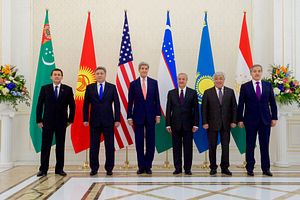It’s not a good week for Central Asian PR. Not only did Freedom House release their Nations in Transit report–in which the Central Asian countries scrape the bottom of the proverbial democracy barrel–but the U.S. State Department’s Bureau of Democracy, Human Rights, and Labor released its 2015 country reports reviewing the human rights practices of nearly every country in the world. Central Asia, again, doesn’t come off well.
Secretary of State John Kerry, in a preface to the report, says, “In every part of the world, we see an accelerating trend by both state and non-state actors to close the space for civil society, to stifle media and Internet freedom, to marginalize opposition voices, and in the most extreme cases, to kill people or drive them from their homes.”
These trends are evident throughout Central Asia, as they are elsewhere in the world.
The report says Uzbekistan “is an authoritarian state…[t]he executive branch under President Islam Karimov dominated political life and exercised nearly complete control.” Tajikistan “is an authoritarian state dominated politically by President Emomali Rahmon and his supporters.” And Turkmenistan is “an authoritarian government controlled by the president, Gurbanguly Berdimuhamedov and his inner circle.”
Kazakhstan escapes the specific word “authoritarian” but not the implication:
The Republic of Kazakhstan has a government system dominated by President Nursultan Nazarbayev and the ruling Nur Otan Party. The constitution concentrates power in the presidency. The president controls the legislature and judiciary as well as regional and local governments. Changes or amendments to the constitution require presidential consent. The April 26 presidential election, in which President Nazarbayev received 97.5 percent of the vote, was marked by irregularities and lacked genuine political competition.
Kyrgyzstan’s entry reads a little differently from its neighbors but nonetheless points out various areas of abuse, particularly rooted in impunity on the part of law enforcement and the security services.
In each country report, State highlights instances of collapsing space for civil society, restricted media environments, and the sidelining of opposition parties.
These are not new assessments and do not necessarily feed into a possible shift in U.S. policy toward the region. In past years, the Bureau of Democracy, Human Rights, and Labor has sounded similar sirens to little discernible effect on overall policy. The overarching logic remains that Washington can be patient with regard to progress, because stability is a priority.
But in light of the IMF’s recent projections (which are also nothing new) pointing to continued economic doldrums, it should be asked where the tipping point is. For states like Kazakhstan, economic good times have placated people. Authoritarian regimes around the world trade prosperity and stability for the hallmarks of democracies–free elections traded away for predictability–but the arrangement breaks down when economic turmoil hits. Paradoxically, economic hard times are also often when states increase control–pushed too far, such repression backfires. This isn’t to say that Central Asia is on the verge of collapse (that argument has been made too many times over the years to hold any water), but that it’s stagnated–economically and politically. Future progress in the first is invariably linked to progress in the latter.

































